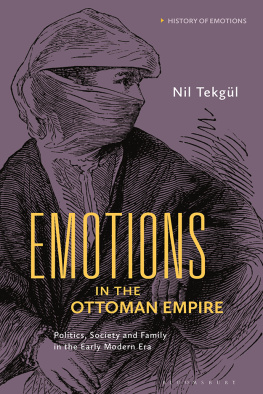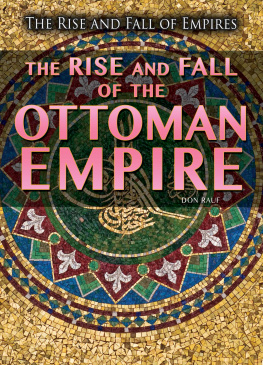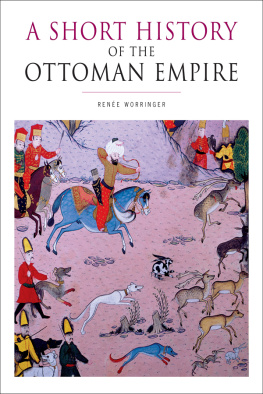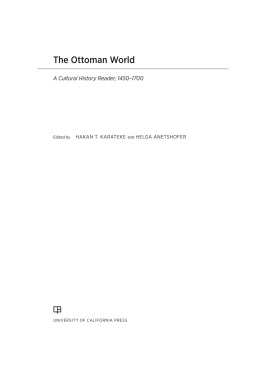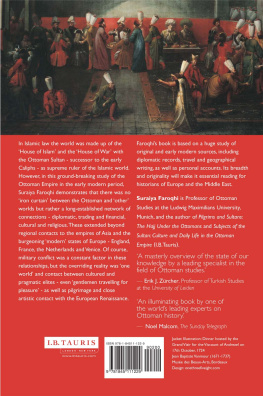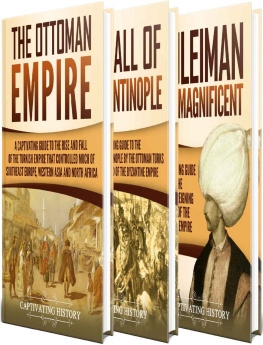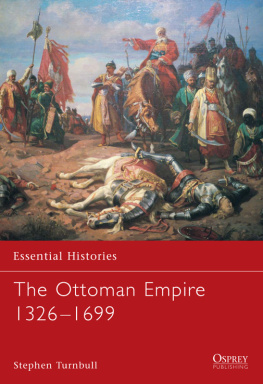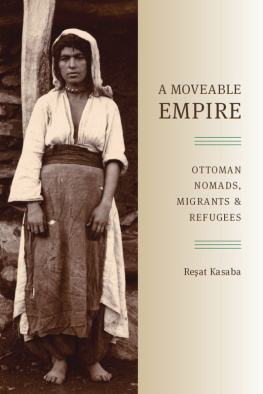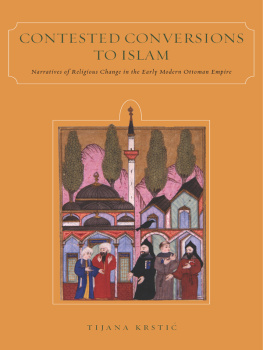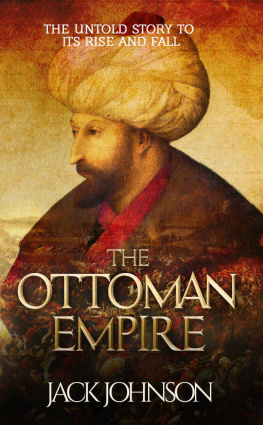Emotions in the Ottoman Empire
History of Emotions
Series Editor:
Peter N. Stearns, University Professor in the Department of History at George Mason University, USA and Susan J. Matt, Presidential Distinguished Professor of History at Weber State University, USA.
Editorial Board:
Rob Boddice, Senior Research Fellow, Academy of Finland Centre of Excellence in the History of Experiences, Tampere University, Finland
Charles Zika, University of Melbourne & Chief Investigator for the Australian Research Councils Centre for the History of Emotions, Australia
Pia Campeggiani, University of Bologna, Italy
Angelika Messner, Kiel University, Germany
Javier Moscoso, Centro de Ciencias Humanas y Sociales, Madrid, Spain
The History of Emotions offers a new and vital approach to the study of the past. The field is predicated on the idea that human feelings change over time and they are the product of culture as well as of biology. Bloomsburys History of Emotions series seeks to publish state-of-the-art scholarship on the history of human feelings and emotional experience from antiquity to the present day, and across all seven continents. With a commitment to a greater thematic, geographical and chronological breadth, and a deep commitment to interdisciplinary approaches, it will offer new and innovative titles which convey the rich diversity of emotional cultures.
Published:
Fear in the German Speaking World, 16002000, edited by Thomas Kehoe and Michael Pickering
Feelings and Work in Modern History, edited by Agnes Arnold-Forster and Alison Moulds
Feeling Dis-Ease in Modern History, edited by Rob Boddice and Bettina Hitzer
Emotional Histories in the Fight to End Prostitution, by Michele Renee Greer
Emotions and Migration in Argentina at the Turn of the 20th Century, by Mara Bjerg
Forthcoming:
The Business of Emotion in Modern History, edited by Andrew Popp and Mandy Cooper
The Renaissance of Feeling, by Kirk Essary
Emotions in the Ottoman Empire
Politics, Society, and Family in the Early Modern Era
Nil Tekgl

Contents
For Ottoman Turkish words I have been guided by the International Journal of Middle East Studies (IJMES) transliteration system, and have used the Turkish alphabet and conventional modern Turkish orthography. The following characters are pronounced as indicated:
c = j as in joke
= ch as in children
= sh as in ship
= undotted i, sounds like the e of women
= soft g, lengthening the sound of the preceding vowel
= sounds like the u of fur
= like French u
Arabic and Turkish terms usually appear in the singular form and are italicized and explained on the first appearance. Whenever the plural form of such terms is required, a Romanized s is added to them.
All translations from Ottoman Turkish are the authors own, unless indicated otherwise.
Names of places commonly known to readers of English have been written in their usual forms.
This book is a revised and improved version of my PhD dissertation completed under the supervision of Prof. zer Ergen at hsan Doramac Bilkent University in 2016. I owe thanks to Bilkent University for all the academic facilities that it provided, without which it would not have been possible to conduct and publish my research. I would like to express my sincere thanks to all those people who contributed and made this unforgettable experience of mine possible.
First and foremost, I would like to express my deepest gratitude (kran) to my advisor Prof. zer Ergen for his continuous support and everlasting patience with my questions. His immense knowledge of Ottoman history and his guidance always enlightened my way throughout my time of research. It would have been impossible to study as elusive a concept as emotions without his continuous encouragement. Throughout the process he was not only my advisor but also my mentor, and I always considered myself lucky to feel his deep support. Thank you Hocam for making my journey not only fulfilling but also enjoyable. I am also proud to consider myself a part of an academic lineage starting from Mehmet Fuat Kprl and continuing to Halil nalck and zer Ergen, who was the first doctorate student of Halil nalck. I am and will always be proud to be one of his students.
I would like to extend my deepest thanks to Peter Stearns and Susan Matt. My journey of writing a book started with their call, published on H-Emotions, for international treatments of the history of emotions. They are prominent historians in the field, and I learned a great deal from their valuable insights and comments on earlier drafts of the manuscript. This book would not have been possible without them. Thank you.
I also thank Margrit Pernau, a prominent historian in the field of history of emotions, whom I met while I was at Harvard University. It was her work, in several publications, that enlightened my thinking on the emotions, and made it possible to improve my dissertation by moving from expressions to experience of emotions and senses. It was also she who made me realize the amazing legacy of Persian culture in Ottoman intellectual life.
I would also like to thank Cemal Kafadar, for not only kindly accepting to be on my dissertation committee but also for being my faculty sponsor while I was at the Harvard University Center for Middle Eastern Studies (CMES) as a post-doctoral visiting scholar. I was lucky to attend the Ottoman history courses that he was offering. His theatrical style of teaching, his immense knowledge of history (always coupled with his modesty), and the wide range of topics and questions that hes interested in definitely shaped my understanding of history and my own style of teaching history. I do not know how he did it, but I always wanted to head for the library once his lecture was over and start a new research on the little wonders and marvels of the ordinary Ottoman people to better understand a complex phenomenon. Thank you.
My thanks and appreciation are also due to CMES for offering me an ideal environment where I had a chance to be a part of an intellectual community that wholeheartedly welcomes academics from all over the world having a passion for seeking knowledge. I have very fond memories of the year I spent at Harvard University. I am also thankful to my colleagues and friends Tark Tansu Yiit, Bedriye Poyraz, Nee Grallar, Belgin Turan zkaya and Jun Akiba for sharing and encouraging my passion in emotions in history and their thoughtful comments on my lecture given at CMES. I miss many of our discussions, and our conversations in Tate Bakery and Shays Pub, and thank them all for making my post-doctoral studies unforgettable.
I also owe thanks to Mehmet Kalpakl, Ali Yaycolu and Tlay Artan, who accepted to be a member of my dissertation committee and also for making thoughtful and valuable remarks to improve my understanding of emotions in history.
Many thanks are due to my colleague and friend Christiane Czygan, who has expertise in Ottoman poetry and the historical expressions of emotions in poems and personal letters, for reading earlier drafts of the manuscript and for her valuable comments.
Theres also someone special whom I would like to thank who passed away long ago. My grandmother, Ferhunde Betin, born in 1907 in Van, a city in the eastern Anatolia, was a member of late Ottoman society in her childhood. She studied in an elementary school in Beyolu, stanbul and shared her memories with me, including how she and her classmates used to shout long live Sultan while standing on the Ottoman sultans way to the Friday prayer. With the promulgation of the Turkish Republic, however, she had always been a proud citizen of the Turkish Republic until she passed away in 1998. After graduating from Kandilli and Erenky Kz Lisesi (a high school for girls) she worked as an elementary school teacher who taught in several cities, towns and villages in orum, zmir and stanbul. She always felt that she was serving her fatherland in the best possible way by teaching students who would design the future of the republic. I always loved to listen to her life story and felt as if I always accompanied her. Her stories, however, based on memories of a distant past, did not resemble the history courses that I had been taking in my high school, for which I did not have much interest. Sadly, I thought history was what we had been learning at high school. It was only in my graduate studies that I realized indeed that history was, or at least should be, what she used to narrate. I should admit that my passion for history owes a great deal to her. I hope shes in peace in heaven now. Thank you Frldakthats what we used to call her. I believe her life, indeed like everyone elses, deserves to be written, which will hopefully constitute one of my future projects that I eagerly look forward to.
Next page
